Welcome to our article on the sacraments of Christianity. In this section, we will explore the meanings, rituals, and importance of two significant sacraments – Baptism and Communion. These sacraments hold great significance in the Christian faith and play a crucial role in the spiritual journey of believers. By gaining a deeper understanding of these sacraments, you will be able to appreciate their place in the rich tapestry of sacramental theology in Christianity.
Before we delve into the specifics of Baptism and Communion, let us first understand what sacraments are and why they are important. Sacraments are visible signs of God’s grace, given to us as a means of experiencing His presence and receiving His blessings. They are sacred rituals that symbolize and communicate the divine mysteries of the Christian faith.
Key Takeaways:
- Baptism and Communion are two essential sacraments in Christianity.
- Sacraments are visible signs of God’s grace and communicate the divine mysteries of the faith.
- Understanding the meanings and rituals of sacraments allows believers to deepen their spiritual connection with God.
- Baptism symbolizes initiation into the Christian faith and the forgiveness of sins.
- Communion represents the body and blood of Christ and the unity of believers with Him and the Church.
The Sacrament of Baptism: Initiation into the Faith
Baptism is a sacred sacrament of initiation into the Christian faith. It symbolizes the forgiveness of sins and the reception of sanctifying grace. In the Catholic tradition, baptism is commonly administered to infants as a way to welcome them into the Church and initiate them into the faith. However, individuals of any age who seek to join the Christian community can receive this sacrament.
The ritual of baptism involves the pouring or sprinkling of holy water on the head of the recipient while invoking the name of the Father, Son, and Holy Spirit. This act signifies the death and resurrection of Jesus Christ and represents the believer’s own spiritual rebirth. Through baptism, one becomes a member of the Church and enters into a covenant relationship with God.
Baptism is seen as an essential requirement for salvation, as it cleanses the soul from original sin and marks the beginning of a lifelong journey of faith. It is a joyful celebration that brings together the community of believers and reminds them of their shared identity as children of God. Through the sacrament of baptism, individuals are united with Christ, becoming part of His body and sharing in His mission of love and salvation.
The Sacrament of Baptism: Key Points
- Baptism is a sacrament of initiation into the Christian faith.
- It symbolizes the forgiveness of sins and the reception of sanctifying grace.
- In the Catholic tradition, it is commonly administered to infants, but individuals of any age can receive it.
- The ritual involves the pouring or sprinkling of holy water on the head, invoking the name of the Father, Son, and Holy Spirit.
- Baptism marks the beginning of a lifelong journey of faith and is a requirement for salvation.
The Significance of Holy Communion
Holy Communion, also known as the Eucharist, is a sacrament of initiation and the central rite of Catholic worship. It represents the body and blood of Christ and is a memorial of His sacrifice on the cross and the Last Supper with His disciples. Catholics believe that during the consecration by the priest, the bread and wine are transformed into the actual body and blood of Christ. The congregation participates in this sacred meal, symbolizing their unity with Christ and the Church.
During Holy Communion, the priest offers the consecrated bread and wine to the communicants, who approach the altar with reverence and receive the body and blood of Christ. This act of partaking in the Eucharist is seen as a powerful means of receiving spiritual nourishment and grace.
“Take this, all of you, and eat it. This is my body, which will be given up for you.”
These words, spoken by Jesus at the Last Supper, form the heart of the Holy Communion ritual. Through the act of consuming the consecrated host and wine, Catholics believe that they are not only remembering Christ’s sacrifice but also entering into a profound communion with Him. This sacrament serves as a vital source of spiritual sustenance, strengthening the faithful and deepening their relationship with God.

The Sacrament of Confirmation: Strengthening Faith
The Sacrament of Confirmation is a vital step in the journey of faith for Catholics. It is a sacrament that strengthens and confirms the faith of individuals who have already been baptized. In this sacrament, the Holy Spirit is invoked and bestowed upon the candidates, sealing their membership in the Church and empowering them to live out their faith boldly.
Gifts of the Holy Spirit
During the Sacrament of Confirmation, candidates receive the gifts of the Holy Spirit, which equip them with special graces to live as faithful disciples of Christ. These gifts include wisdom, understanding, counsel, fortitude, knowledge, piety, and fear of the Lord. Through these gifts, individuals are guided and strengthened in their faith journey, enabling them to embrace their calling as witnesses of Christ in the world.
“Confirmation seals the membership in the Church and confers the gifts of the Holy Spirit.”
Confirmation is typically administered by a bishop or a priest, who extends their hands over the candidates and anoints them with sacred chrism oil. The anointing is accompanied by a prayer for the outpouring of the Holy Spirit. This sacrament not only deepens the individual’s relationship with God but also strengthens their connection to the Christian community, as they become full participants in the life of the Church.
Table: Sacrament of Confirmation vs. Sacrament of Baptism
| Sacrament of Confirmation | Sacrament of Baptism |
|---|---|
| Administered by a bishop or a priest | Administered by a priest or deacon |
| Seals the membership in the Church | Initiates into the Christian faith |
| Anointing with sacred chrism oil | Pouring or sprinkling of holy water |
| Strengthens and empowers individuals in their faith | Brings sanctifying grace and forgives original sin |
Through the Sacrament of Confirmation, individuals are called to live out their faith in a more mature and committed way. Strengthened by the Holy Spirit and equipped with the gifts bestowed upon them, they are empowered to bear witness to Christ’s love, truth, and mercy in their lives and in the world. Confirmation is a significant milestone in the spiritual journey of a Catholic, deepening their faith and inviting them to embrace their role as active members of the Church.
The Sacrament of Reconciliation: Healing and Forgiveness
The Sacrament of Reconciliation, also known as Confession or Penance, is a powerful sacrament in the Catholic Church that offers healing and forgiveness to those who seek it. Through this sacrament, believers can experience the grace of God and reconcile with Him and the Church. The sacrament is rooted in the belief that all humans are prone to sin and need forgiveness to restore their relationship with God.
In the Sacrament of Reconciliation, the penitent confesses their sins to a priest who acts as a spiritual guide and arbiter of God’s forgiveness. The priest provides counsel, guidance, and absolution to the penitent, allowing them to experience the healing power of God’s love and mercy. The act of confession and the subsequent penance bring about spiritual renewal and a restored sense of communion with God and the Church.
Penance is an integral part of the Sacrament of Reconciliation. It involves the penitent performing acts of restitution or penance as a way to make amends for their sins. This may include prayers, acts of charity, or other actions that demonstrate genuine contrition and a desire for spiritual growth. Penance serves as a tangible expression of the penitent’s commitment to change and grow closer to God.
| Sacrament of Reconciliation | Healing and Forgiveness |
|---|---|
| Beliefs | The sacrament is rooted in the belief that all humans are prone to sin and need forgiveness to restore their relationship with God. |
| Ritual | The penitent confesses their sins to a priest, receives counsel, absolution, and performs acts of penance. |
| Benefits | Offers healing, forgiveness, and spiritual renewal; restores communion with God and the Church. |
The Sacrament of Reconciliation is a source of great comfort and hope for those burdened by the weight of their sins. It provides a pathway to forgiveness, healing, and a renewed relationship with God. Through this sacrament, believers can experience the transformative power of God’s love and mercy, allowing them to grow in holiness and closer to their faith.
The Sacrament of Anointing of the Sick: Comfort and Strength
The Sacrament of Anointing of the Sick, also known as Extreme Unction, is a powerful sacrament performed in the Catholic Church to bring comfort, strength, and healing to those who are facing serious illness or injury. It is a sacred ritual that provides spiritual support during times of physical and emotional difficulty.
Through the anointing of the individual’s head and hands with holy oil, the sacrament unites the suffering of the person with that of Christ, offering solace and hope. It is accompanied by prayers for healing and the forgiveness of sins, bringing comfort to both the body and the soul.
This sacrament can be received by anyone who is facing serious illness, those awaiting surgery, or the elderly who are in need of spiritual support. It is a beautiful and meaningful way for individuals to find strength and peace in their time of need.
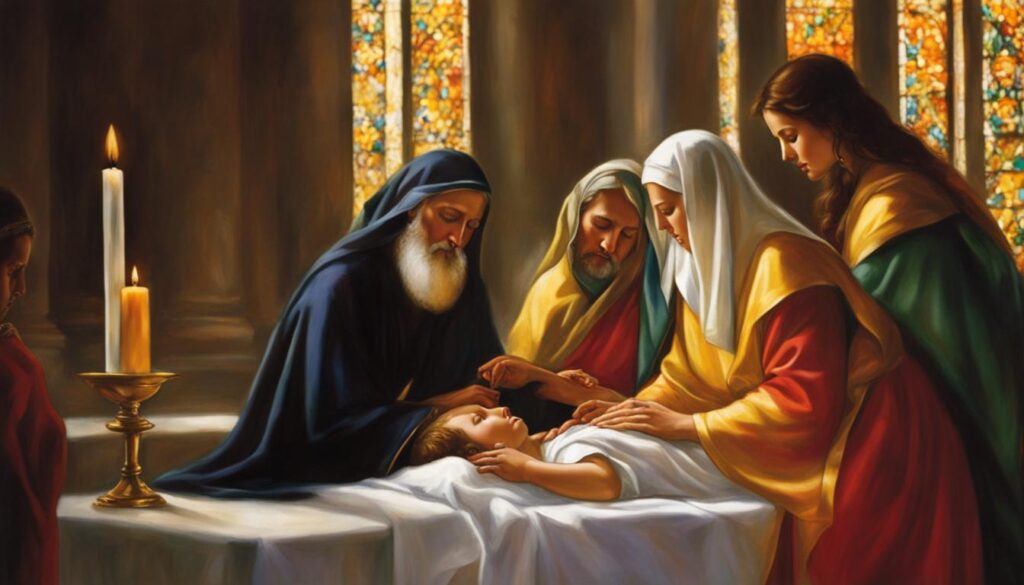
Table: Benefits of the Sacrament of Anointing of the Sick
| Benefits | Description |
|---|---|
| Comfort | The sacrament brings comfort and consolation to the sick, offering them a sense of peace and tranquility during difficult times. |
| Strength | Through the sacrament, the sick receive strength and courage to face their illness, both physically and emotionally. |
| Healing | The sacrament invokes God’s healing power, bringing hope for physical healing and spiritual restoration. |
By receiving the Sacrament of Anointing of the Sick, individuals can find comfort, strength, and healing as they navigate the challenges of illness. It is a reminder of God’s love and presence in their lives, offering solace and support in times of difficulty.
The Sacrament of Marriage: Union in Christ
The Sacrament of Marriage is a sacred union between a baptized man and a baptized woman, signifying their lifelong partnership and reflecting the union of Christ with the Church. It is a covenantal relationship rooted in love and commitment, where the couple becomes a visible sign of God’s love for His people. Through the sacrament, the couple not only joins their lives together but also invites God to be present in their relationship, seeking His guidance and blessing.
Marriage holds a special place in the Catholic Church, as it is considered indissoluble and a means of grace for the couple. The sacrament sanctifies the love between husband and wife and empowers them to grow in holiness together. It calls them to self-giving, sacrificial love, mirroring the love of Christ for His Church. The couple is entrusted with the responsibility of nurturing their relationship and raising children within the teachings of the Church, fostering an environment of faith and love.
As Pope Francis said, “Marriage is a journey of growing together, a journey that lasts a lifetime.” This lifelong partnership requires ongoing effort, communication, and mutual respect. It offers opportunities for personal growth, forgiveness, and the building of a strong foundation for the family. Marriage provides a supportive and loving environment where both individuals can flourish and become the best versions of themselves.
| Benefits of the Sacrament of Marriage | Rights and Responsibilities |
|---|---|
|
|
“Love is patient, love is kind. It always protects, always trusts, always hopes, always perseveres.” – 1 Corinthians 13:4-7
Marriage is a sacrament that brings couples closer to God and invites them to participate in His divine plan for creation. As they live out their union in Christ, they become witnesses of God’s love and share in His mission to build a world rooted in love, compassion, and unity.

The Sacrament of Holy Orders: Ordination and Service
The Sacrament of Holy Orders is a sacred ceremony that conveys ordination to deacons, priests, and bishops within the Catholic Church. It marks their dedication to serve the Church and the faithful, granting them specific roles and responsibilities.
“The Sacrament of Holy Orders confers a special character and sacramental power upon those who are ordained.”
Deacons, ordained after a period of formation, assist priests in preaching the Gospel, administering sacraments, and performing charitable works. They can baptize, witness marriages, and proclaim the Gospel during Mass. Priests, ordained through the laying on of hands by a bishop, serve as spiritual leaders of parishes and celebrate the sacraments, including the consecration of the Eucharist. Bishops, ordained by other bishops in the apostolic succession, have the fullness of Holy Orders and exercise pastoral authority over a diocese. They can ordain priests and deacons, confirm the faithful, and govern the Church.
The Three Degrees of Holy Orders
The Sacrament of Holy Orders consists of three degrees: the diaconate, the priesthood, and the episcopate. Each degree builds upon the previous one, signifying a deeper level of commitment and responsibility within the Church.
| Diaconate | Priesthood | Episcopate |
|---|---|---|
| The first degree of Holy Orders, encompassing the role of a deacon. Deacons assist priests and bishops in their pastoral duties and serve the community through acts of charity. | The second degree of Holy Orders, conferring the priesthood. Priests are ordained to celebrate the sacraments, preach the Word of God, and shepherd the faithful. | The highest degree of Holy Orders, reserved for bishops. Bishops are entrusted with the authority to govern the Church, ordain priests and deacons, and preserve the apostolic tradition. |
The Sacrament of Holy Orders is a sacred calling, requiring discernment, formation, and dedication to a life of service. It represents a commitment to the Church and the faithful, as ordained ministers carry out their duties with love, humility, and devotion.
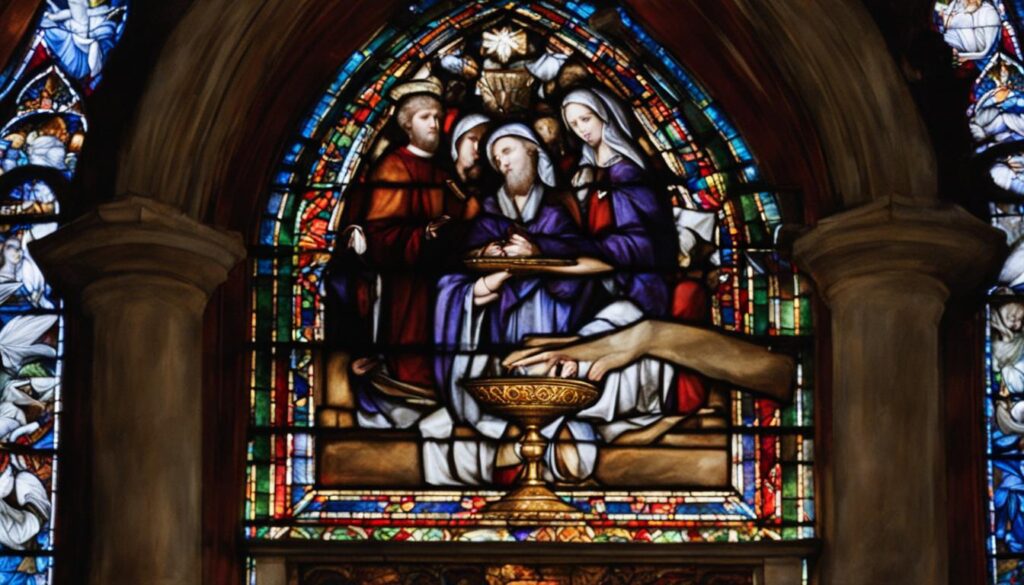
The image above represents the ordination of a deacon, showcasing the solemnity and reverence of the sacramental ceremony.
Conclusion
In conclusion, the sacraments in Christianity hold immense significance for believers. These sacred rituals, including Baptism, Communion, Confirmation, Reconciliation, Anointing of the Sick, Marriage, and Holy Orders, are not mere ceremonies but powerful encounters with God’s grace. They provide essential moments of connection, healing, and empowerment on the journey of faith.
The sacraments serve as visible signs of God’s presence and love, bringing believers closer to their Creator and to one another. Each sacrament has a distinct purpose and meaning, from the initiation into the faith through Baptism to the lifelong union in marriage. Through these sacraments, Christians receive the forgiveness of sins, the strengthening of faith, and the outpouring of the Holy Spirit’s gifts.
The importance of sacraments lies in their ability to nourish and transform the lives of believers. They offer opportunities for repentance, reconciliation, and spiritual growth. By participating in these sacred rituals, Christians engage in a deeper relationship with God and become active members of the Church community.
In summary, the sacraments in Christianity are not mere rituals but powerful channels of God’s grace. They provide believers with the means to encounter God, receive His forgiveness and love, and live out their faith in the world. Understanding and embracing the sacraments is essential for every Christian on their spiritual journey.
FAQ
What are sacraments in Christianity?
Sacraments are sacred rituals or ceremonies in Christianity that are believed to confer God’s grace and play an essential role in the believer’s spiritual journey.
How many sacraments are there in Christianity?
There are seven sacraments in Christianity: Baptism, Holy Communion, Confirmation, Reconciliation, Anointing of the Sick, Marriage, and Holy Orders.
What is the Sacrament of Baptism?
Baptism is the sacrament of admission to the Christian faith. It brings sanctifying grace and symbolizes the forgiveness of sins.
Who can receive the Sacrament of Baptism?
In Catholicism, infant baptism is common, but unbaptized children or adults who wish to join the faith can also receive the sacrament.
What is the significance of Holy Communion?
Holy Communion, also known as the Eucharist, represents the body and blood of Christ. It is a memorial of His sacrifice on the cross and the Last Supper with His disciples.
Do Catholics believe the bread and wine in Holy Communion become the actual body and blood of Christ?
Yes, Catholics believe that during the consecration by the priest, the bread and wine are transformed into the actual body and blood of Christ.
What is the purpose of the Sacrament of Confirmation?
Confirmation confirms and strengthens a person’s faith. It seals membership in the Church and confers the gifts of the Holy Spirit.
What is the Sacrament of Reconciliation?
Reconciliation, also known as Confession or Penance, is a sacrament of healing and forgiveness. It allows Catholics to confess their sins to a priest and receive absolution.
When is the Sacrament of Reconciliation typically performed?
Reconciliation can be done as often as needed and is usually performed when the penitent feels the need for renewal, self-reflection, and forgiveness.
What is the purpose of the Sacrament of Anointing of the Sick?
The Sacrament of Anointing of the Sick brings comfort and strength to the ill or injured. It unites the suffering of the individual with that of Christ and offers spiritual support during difficult times.
What is the Sacrament of Marriage?
Marriage is a sacrament that signifies the union of a baptized man and a baptized woman in a lifelong partnership. It reflects the union of Christ with the Church and is understood to be indissoluble.
Who can receive the Sacrament of Holy Orders?
The Sacrament of Holy Orders is available only to men who are ordained as deacons, priests, or bishops. It confers a special character and sacramental power to those ordained.

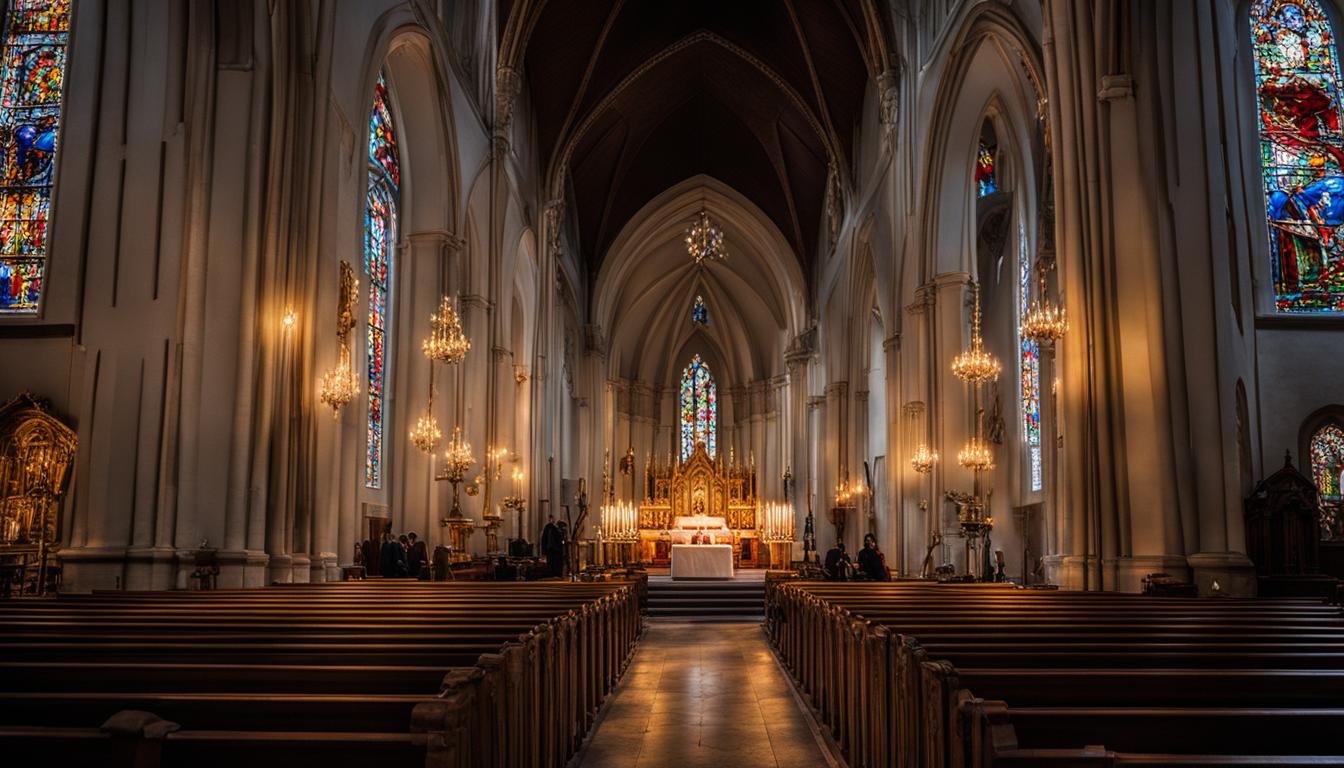




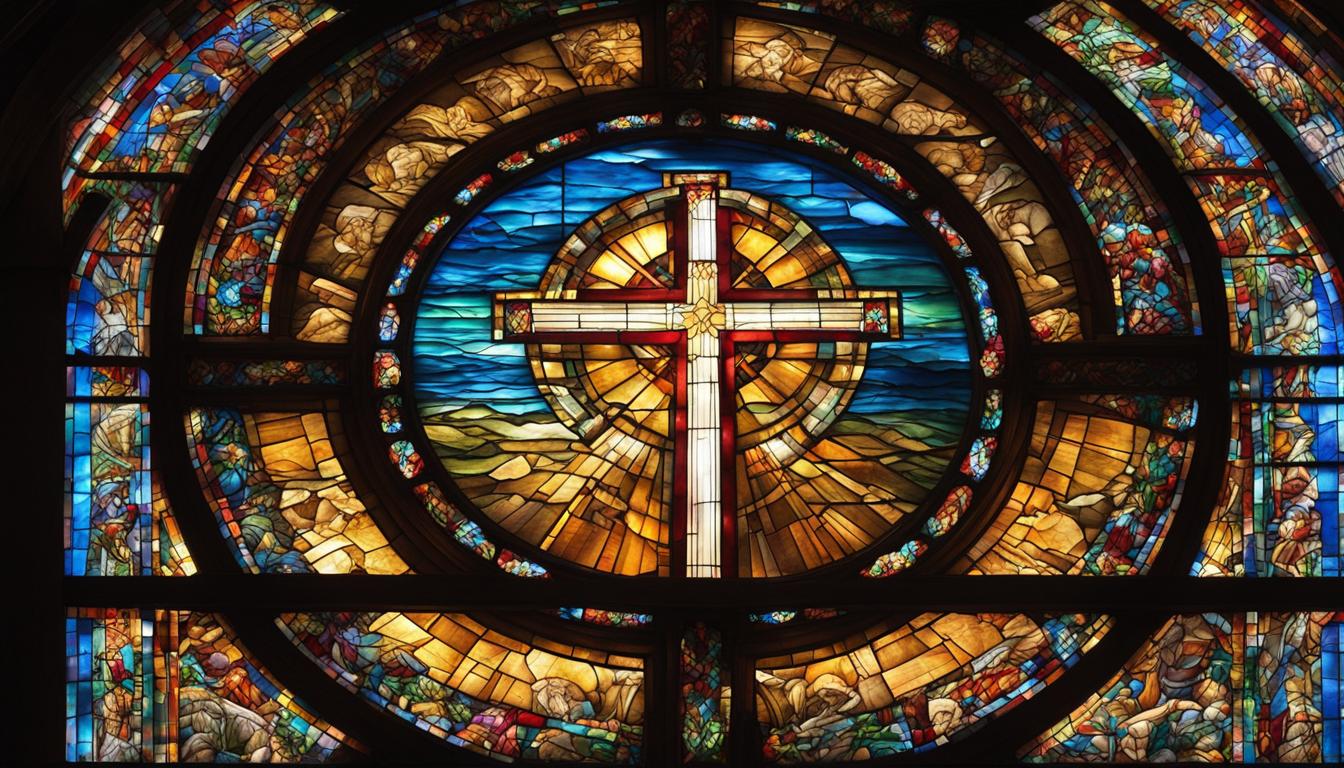




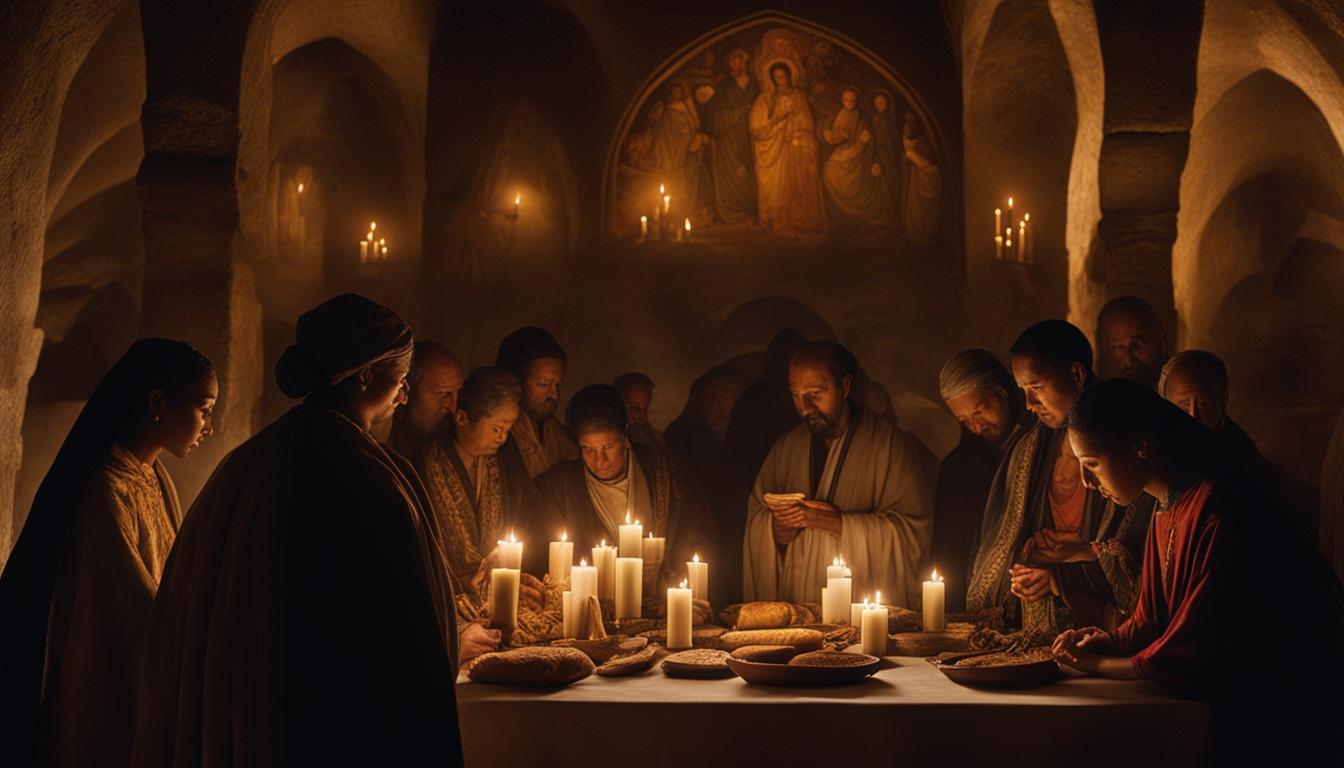


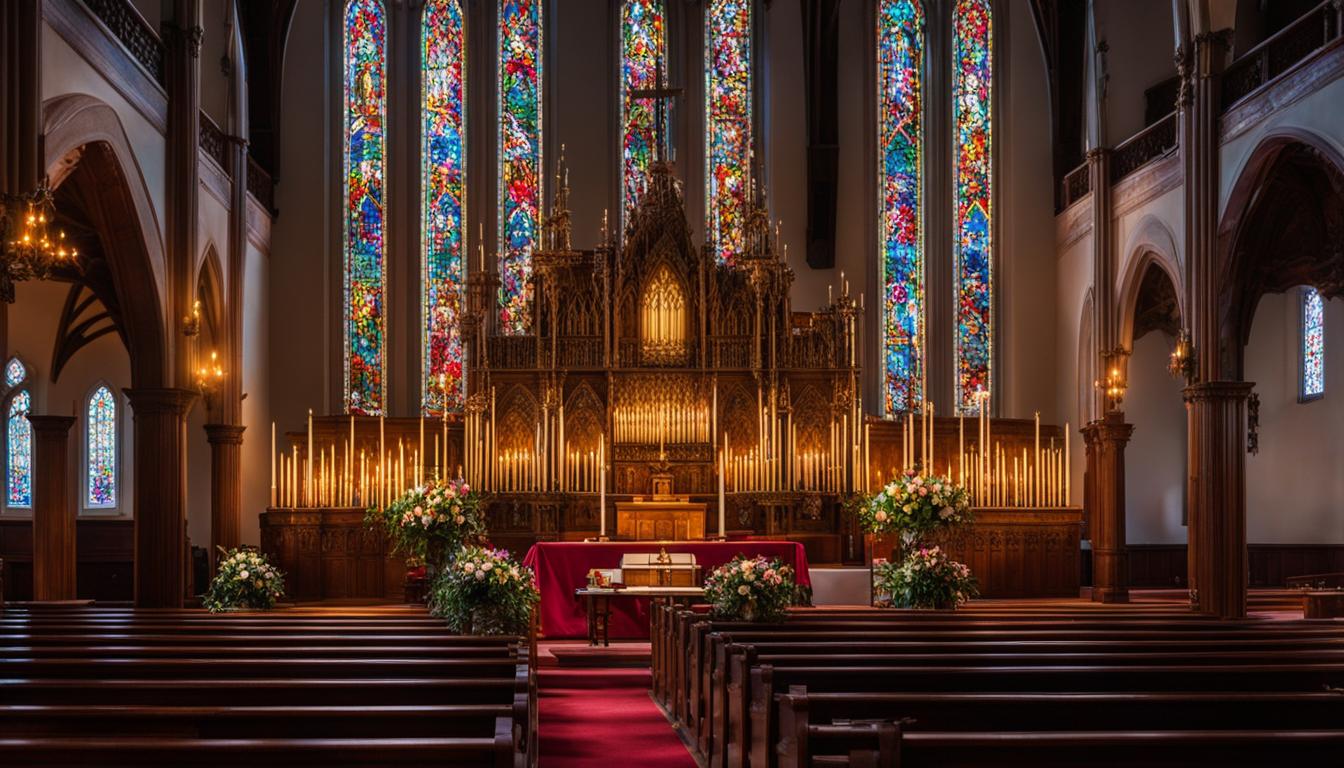
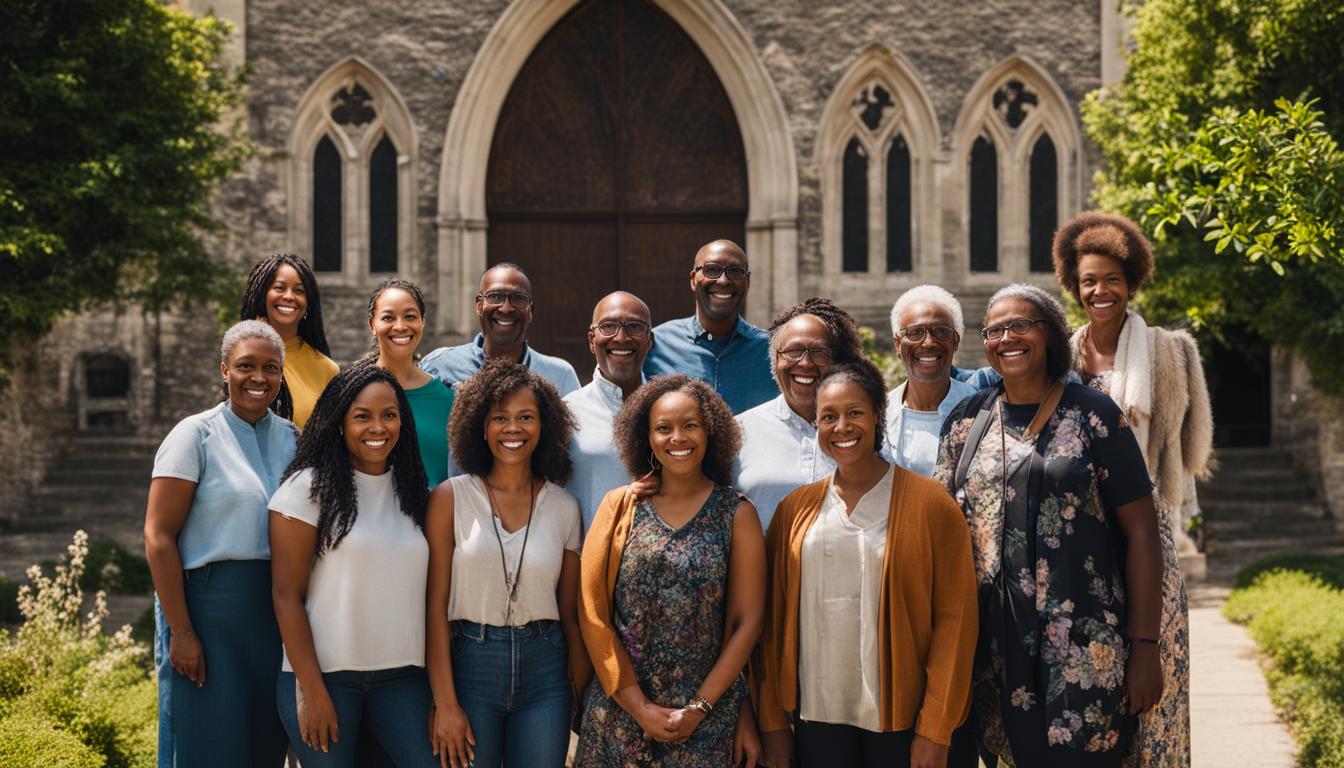

I don’t think the title of your article matches the content lol. Just kidding, mainly because I had some doubts after reading the article.